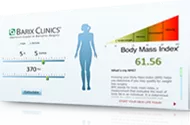If you suffer from obesity, there is a good chance that you are familiar with one of the stages of gastroesophageal reflux disease, more commonly referred to as GERD. In fact, the Texas GERD Institute conducted several studies that show obesity nearly doubles the chance of GERD symptoms and triples the risk of developing esophageal cancer.
Bariatric surgery has proved to be a successful treatment in alleviating all stages of GERD and its symptoms. In a study conducted by Dr. Fernando Fornari of the University of Passo Fundo, gastric bypass surgery eliminated GERD in nearly all of the 86 obese patients who were evaluated.
Read more:
How do you know if you have GERD?
GERD is caused by a backflow of acidic or non-acidic stomach contents that enter the esophagus. Typically referred to as heartburn, everyone has GERD now and again. Symptoms vary widely, but recurring or severe GERD issues can cause major discomfort and serious — even life-threatening — health issues.
Symptoms of GERD may include:
- Belching to relieve pain or discomfort
- Difficulty or pain when swallowing
- Waterbrash — a sudden excess of saliva
- Dysphagia — the sensation of food sticking in the esophagus
- Chronic sore throat
- Laryngitis
- Gum inflammation
- Erosion of the enamel of the teeth
- Chronic irritation in the throat
- Hoarseness in the morning
- A sour taste
- Bad breath
Stages of GERD
Stage 1: Occasional heartburn that can be suppressed by over-the-counter medications.
Stage 2: Higher-intensity symptoms managed through long-term, prescription-strength acid suppressive medications. Some may see a GERD specialist.
Stage 3: Symptoms cannot be controlled by medications. Stage 3 GERD sufferers typically experience a lower quality of life. Regurgitation may be frequent and consultation with a specialist is necessary.
Stage 4: Esophageal damage from many years of severe reflux. May develop a pre-cancerous condition called Barrett’s esophagus or dysplasia, which can raise the risk of developing reflux-induced esophageal cancer.
GERD treatment strategies
Gastric bypass surgery is effective at curing GERD because the acid-producing portion of your stomach is disconnected entirely during the procedure. A small upper stomach is created, which has very few cells that can even create acid. In fact, symptoms may disappear as soon as the first day after surgery. This relief allows the esophagus to heal and eliminates chronic pain associated with this harmful illness.
Imagine how much your life can change in one day! Michael R. explains how big of a difference it made in his life.
“I call the surgery a miracle. It’s changed my life completely,” he said. “People say I act 15 years younger. I am 100 percent more happy and satisfied with myself.”
Qualifying for Bariatric Surgery
Bariatric surgery is a major decision that you should consider carefully. There are certain guidelines you must meet in order to qualify for bariatric surgery.
Most surgeons require bariatric surgery candidates to experience the following:
- Unsuccessful weight loss through diet and/or exercise programs
- A body mass index (BMI) of 40 or higher (extreme obesity) OR
- A body mass index (BMI) of 35 to 39.9 (obesity) with serious weight-related health issues such as type 2 diabetes, high blood pressure or severe GERD
If you meet these requirements, you’ll go through another screening process where a team of professionals evaluate the following factors:
- Nutrition and weight history
- Medical condition
- Psychological status
- Motivation
- Age
Thankfully, Barix Clinics is here to walk you through every single step, so you feel well-informed, safe and excited to enter a huge life change with positivity.
“The staff was exceptional,” Natisha R. told us. “It helped that many of them were former patients themselves and had been through the process.”
Don’t wait to make a decision that can change your life in more ways than you thought possible.





